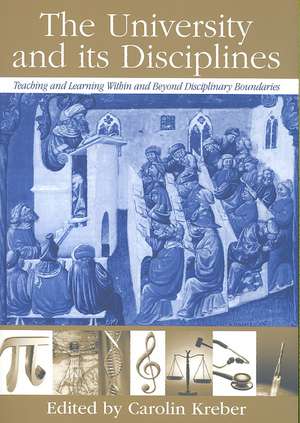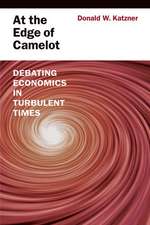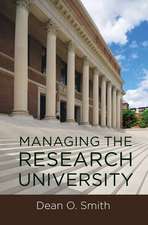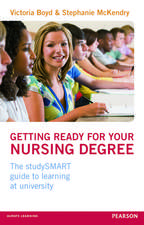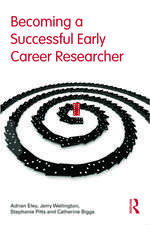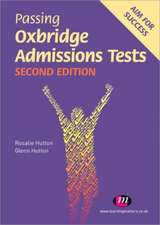The University and its Disciplines: Teaching and Learning within and beyond disciplinary boundaries
Autor Carolin Kreberen Limba Engleză Paperback – 17 sep 2008
What are the ‘ways of thinking and practicing’ characteristic of particular disciplines? How can students be supported in becoming participants of particular disciplinary discourse communities?
Can the diversity in teaching, learning and assessment practices that we observe across departments be attributed exclusively to disciplinary structure?
To what extent do the disciplines prepare students for the complexities and uncertainties that characterize their later professional, civic and personal lives?
Written for university teachers, educational developers as well as new and experienced researchers of Higher Education, this highly-anticipated first edition offers innovative perspectives from leading Canadian, US and UK scholars on how academic learning within particular disciplines can help students acquire the skills, abilities and dispositions they need to succeed academically and also post graduation.
Carolin Kreber is Professor of Teaching and Learning in Higher Education and the Director of the Centre for Teaching, Learning and Assessment at the University of Edinburgh
| Toate formatele și edițiile | Preț | Express |
|---|---|---|
| Paperback (1) | 490.99 lei 6-8 săpt. | |
| Taylor & Francis – 17 sep 2008 | 490.99 lei 6-8 săpt. | |
| Hardback (1) | 1007.48 lei 6-8 săpt. | |
| Taylor & Francis – 17 sep 2008 | 1007.48 lei 6-8 săpt. |
Preț: 490.99 lei
Nou
Puncte Express: 736
Preț estimativ în valută:
93.95€ • 98.36$ • 77.74£
93.95€ • 98.36$ • 77.74£
Carte tipărită la comandă
Livrare economică 05-19 aprilie
Preluare comenzi: 021 569.72.76
Specificații
ISBN-13: 9780415965217
ISBN-10: 0415965217
Pagini: 272
Ilustrații: 5 black & white illustrations, 8 black & white tables
Dimensiuni: 178 x 254 x 13 mm
Greutate: 0.5 kg
Ediția:1
Editura: Taylor & Francis
Colecția Routledge
Locul publicării:Oxford, United Kingdom
ISBN-10: 0415965217
Pagini: 272
Ilustrații: 5 black & white illustrations, 8 black & white tables
Dimensiuni: 178 x 254 x 13 mm
Greutate: 0.5 kg
Ediția:1
Editura: Taylor & Francis
Colecția Routledge
Locul publicării:Oxford, United Kingdom
Public țintă
Academic and Professional Practice & DevelopmentCuprins
@contents:Part I. Introduction: Setting the context
Chapter One: Supporting Student Learning in the Context of Diversity, Complexity and Uncertainty, Carolin Kreber
Chapter Two: The Modern Research University and its Disciplines: The Interplay between Contextual and Context-transcendent Influences on Teaching, Carolin Kreber
Part II. Disciplines and their epistemological structure
Chapter Three (research-based): The Commons: Disciplinary and Interdisciplinary Encounters, Janet Donald
Chapter Four (reactive): Academic Disciplines: Homes or Barricades?, Gary Poole
Chapter Five (reactive): Hard and Soft – A Useful Way of Thinking about Disciplines? Reflections from Engineering Education on Disciplinary Identities, Bob Matthew and Jane Pritchard
Part III. Ways of thinking and practicing
Chapter Six (research-based): Ways of Thinking and Practicing in Biology and History: Disciplinary Aspects of Teaching and Learning Environments, Dai Hounsell and Charles Anderson
Chapter Seven (reactive): Exploring Disciplinarity in Academic Development: Do "Ways of Thinking and Practicing" Help Higher Education Practitioners to Think about Learning and Teaching?, Nicola Reimann
Chapter Eight (reactive): Opening History’s "Black Boxes": Decoding the Disciplinary Unconscious of Historians, David Pace
Part IV. Exploring disciplinary teaching and learning from a socio-cultural perspective
Chapter Nine (research-based) : Guiding Students into a Discipline: The Significance of the Teacher, Andy Northedge and Jan McArthur
Chapter Ten (reactive): Diverse Student Voices within Disciplinary Discourses, Jan McArthur
Chapter Eleven (reactive): Guiding Students into a Discipline: The Significance of the Student’s View, Lewis Elton
Part V. Learning partnerships in disciplinary learning
Chapter Twelve (research-based): Educating Students for Self-authorship: Learning Partnerships to Achieve Complex Outcomes , Marcia Baxter Magolda
Chapter Thirteen (reactive): Supporting Student Development in and beyond the Disciplines: the Role of the Curriculum, Alan Jenkins
Chapter Fourteen (reactive): Constraints to Implementing Learning Partnership Models and Self-Authorship in the Arts and Humanities, Vicky Gunn
Part VI. Disciplines and their interactions with Teaching and Learning Regimes
Chapter Fifteen (research-based): Beyond Epistemological Essentialism: Academic Tribes in the21st Century, Paul Trowler
Chapter Sixteen (reactive): Exploring Teaching and Learning Regimes in Higher Education Settings, Joelle Fanghanel
Chapter Seventeen (reactive): Teaching and Learning Regimes from within – Significant Networks as a Locus for the Social Construction of Teaching and Learning, Torgny Roxa and Katarina Martensson
Part VII. General observations on previous themes
Chapter Eighteen: Assessment for Career and Citizenship, Mantz Yorke
Chapter Nineteen: Teaching within and beyond Disciplinary Boundaries: The Challenge for Faculty, Velda McCune
Chapter One: Supporting Student Learning in the Context of Diversity, Complexity and Uncertainty, Carolin Kreber
Chapter Two: The Modern Research University and its Disciplines: The Interplay between Contextual and Context-transcendent Influences on Teaching, Carolin Kreber
Part II. Disciplines and their epistemological structure
Chapter Three (research-based): The Commons: Disciplinary and Interdisciplinary Encounters, Janet Donald
Chapter Four (reactive): Academic Disciplines: Homes or Barricades?, Gary Poole
Chapter Five (reactive): Hard and Soft – A Useful Way of Thinking about Disciplines? Reflections from Engineering Education on Disciplinary Identities, Bob Matthew and Jane Pritchard
Part III. Ways of thinking and practicing
Chapter Six (research-based): Ways of Thinking and Practicing in Biology and History: Disciplinary Aspects of Teaching and Learning Environments, Dai Hounsell and Charles Anderson
Chapter Seven (reactive): Exploring Disciplinarity in Academic Development: Do "Ways of Thinking and Practicing" Help Higher Education Practitioners to Think about Learning and Teaching?, Nicola Reimann
Chapter Eight (reactive): Opening History’s "Black Boxes": Decoding the Disciplinary Unconscious of Historians, David Pace
Part IV. Exploring disciplinary teaching and learning from a socio-cultural perspective
Chapter Nine (research-based) : Guiding Students into a Discipline: The Significance of the Teacher, Andy Northedge and Jan McArthur
Chapter Ten (reactive): Diverse Student Voices within Disciplinary Discourses, Jan McArthur
Chapter Eleven (reactive): Guiding Students into a Discipline: The Significance of the Student’s View, Lewis Elton
Part V. Learning partnerships in disciplinary learning
Chapter Twelve (research-based): Educating Students for Self-authorship: Learning Partnerships to Achieve Complex Outcomes , Marcia Baxter Magolda
Chapter Thirteen (reactive): Supporting Student Development in and beyond the Disciplines: the Role of the Curriculum, Alan Jenkins
Chapter Fourteen (reactive): Constraints to Implementing Learning Partnership Models and Self-Authorship in the Arts and Humanities, Vicky Gunn
Part VI. Disciplines and their interactions with Teaching and Learning Regimes
Chapter Fifteen (research-based): Beyond Epistemological Essentialism: Academic Tribes in the21st Century, Paul Trowler
Chapter Sixteen (reactive): Exploring Teaching and Learning Regimes in Higher Education Settings, Joelle Fanghanel
Chapter Seventeen (reactive): Teaching and Learning Regimes from within – Significant Networks as a Locus for the Social Construction of Teaching and Learning, Torgny Roxa and Katarina Martensson
Part VII. General observations on previous themes
Chapter Eighteen: Assessment for Career and Citizenship, Mantz Yorke
Chapter Nineteen: Teaching within and beyond Disciplinary Boundaries: The Challenge for Faculty, Velda McCune
Recenzii
"Professor Kreber draws on an impressive array of scholars and practitioners from the UK, Europe, the US and Canada to explore the central question: are academic disciplines up to the task of preparing undergraduates for life, work and civic engagement in today's complex, uncertain world? This wide-ranging and challenging concern is explored from a number of perspectives which go far beyond the oft-rehearsed notions of graduate attributes." --Fran Beaton, ESCalate, February 11, 2009
"...Professionals who have the responsibility to ponder the nature of higher education in the twenty-first century will find a provocative and rewarding basis for their work here."--Max Oromaner, Education Review (November 2009)
"This book is an instructive treasure chest and it can, indeed, help us open up our sense of who "we" are and who our students might become. Thinking through these issues forces us to think deeply and theoretically about our field in new ways."--Teaching Theology and Religion
"...Professionals who have the responsibility to ponder the nature of higher education in the twenty-first century will find a provocative and rewarding basis for their work here."--Max Oromaner, Education Review (November 2009)
"This book is an instructive treasure chest and it can, indeed, help us open up our sense of who "we" are and who our students might become. Thinking through these issues forces us to think deeply and theoretically about our field in new ways."--Teaching Theology and Religion
Descriere
University teaching and learning take place within ever more specialized disciplinary settings, each characterized by its unique traditions, concepts, practices and procedures. It is now widely recognized that support for teaching and learning needs to take this discipline-specificity into account. However, in a world characterized by rapid change, complexity and uncertainty, problems do not present themselves as distinct subjects but increasingly within trans-disciplinary contexts calling for graduate outcomes that go beyond specialized knowledge and skills. This ground-breaking book highlights the important interplay between context-specific and context-transcendent aspects of teaching, learning and assessment.
